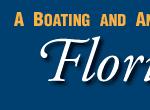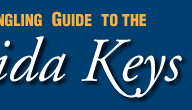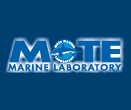CONTACT US:
Florida Fish and Wildlife
Conservation Commission
Fish and Wildlife
Research Institute
100 Eighth Avenue SE
St. Petersburg, Florida 33701
727-896-8626
|
|
|
Mote Marine Laboratory
Tropical Research Laboratory
24244 Overseas Hwy.
Summerland Key, FL 33042
305-745-2729
|
|
|

|
|
This project was funded in part by a grant awarded from Mote Marine Laboratory's Protect Our Reefs Grants Program, which is funded by proceeds from the sale of the Protect Our Reefs specialty license plate. Learn more at .
|
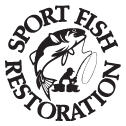
|
|
Additional funding for this project was obtained through the Federal Aid in Sport Fish Restoration Fund.
|
|
|
 |
|
"Fish on!" is a popular phrase echoed by anglers throughout the Florida keys. This area is a popular destination for many anglers trying to catch the big one. According to IGFA, 14 all-tackle world records and numerous line-class records have been set by anglers fishing out of the Florida Keys. In addition, there are many fishing tournaments held in the area; some are part of regional or national fishing tours.
|
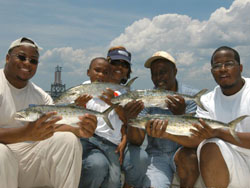
© OsbornePhotography.com
|
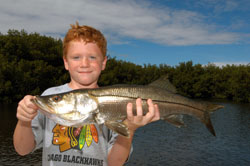
© OsbornePhotography.com
|
Anglers can hope to catch a variety of fish species in the area. Inshore species include snook, red drum (redfish), sheepshead, bonefish, tarpon, and permit. Some popular offshore species are king mackerel (kingfish), red, black, and gag grouper, dolphin (mahi mahi), yellowtail snapper, and sailfish. It is easy to say that there is something swimming for everyone to catch.
|
|
This section of the Web site offers information for Florida Keys anglers. Anglers can read about proper catch-and-release techniques which are important when sport fish cannot be kept because of the fish's size or a closed season. This section also includes a list of popular sport fish, including pictures. The site has a list of fishing piers and artificial reefs including GPS coordinates which is displayed on the Boating and Angling Guides to the Upper, Middle, and Lower Keys.
More information about fishing in the waters of the Florida Keys can be found at the following Web sites:
FWC, Division of Marine Fisheries Management
Florida, Fishing Capital of the World
|
SHORELINE FISHING LICENSE
Florida residents fishing for saltwater species from the shore or from a structure fixed to shore are required to have a shoreline fishing license. The annual resident shoreline fishing license is now free. Those who obtain the license over the phone or off the internet will have to pay a convenience fee of less than $5. Resident anglers may consider purchasing a $17.00 one-year saltwater license which covers both shoreline and watercraft recreational fishing. Exemptions are listed below:
For more information about the shoreline exemption and fishing licenses, please visit FWC, Division of Recreational Licenses and Permits.
|
MONOFILAMENT RECYCLING
The Monofilament Recovery and Recycling Program (MRPP) is a statewide effort to educate the public on the problems caused by monofilament line left in the environment, to encourage recycling through a network of line recycling bins and drop-off locations, and to conduct volunteer monofilament line cleanup events.
Place used or old fishing line in outdoor recycling bins mounted at many piers, boat ramps, and marinas throughout the state. Indoor recycling bins are also available at many tackle shops.
To find the nearest recycling location, please visit the MRPP Web site.
|

|
|
|
|
If you are out snorkeling, diving, fishing, paddling, or boating and see anything that may be unusual or out of the ordinary (including lionfish) in the waters around the Keys , please record the location, date, and time, and contact the Marine Ecosystem Event Response and Assessment (MEERA) project. They can be reached by phone (305-395-8730), e-mail, or online.
If you have any questions, comments, or suggestions about this Web site, please e-mail us at Boating_Guides@MyFWC.com.
Would you like to receive notices of changes to this Web site and the Boating and Angling Guides to the Upper, Middle, or Lower Keys? If so, please e-mail us and include SUBSCRIBE-KEYS in the subject line.
|
